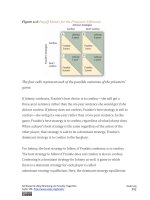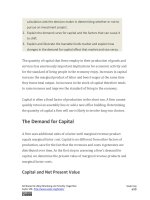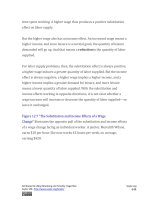Authors libby rittenberg 843
Bạn đang xem bản rút gọn của tài liệu. Xem và tải ngay bản đầy đủ của tài liệu tại đây (492.77 KB, 1 trang )
In the decades after the Civil War, giant corporations and cartels began to
dominate railroads, oil, banking, meat packing, and a dozen other
industries. These businesses were led by entrepreneurs who, rightly or
wrongly, have come to be thought of as “robber barons” out to crush their
competitors, monopolize their markets, and gouge their customers. The
term “robber baron” was associated with such names as J.P. Morgan and
Andrew Carnegie in the steel industry, Philip Armour and Gustavas and
Edwin Swift in meat packing, James P. Duke in tobacco, and John D.
Rockefeller in the oil industry. They gained their market power through
cartels and other business agreements aimed at restricting competition.
Some formed trusts, a combination of corporations designed to
consolidate, coordinate, and control the operations and policies of several
companies. It was in response to the rise of these cartels and giant firms
that antitrust policy was created in the United States.
Antitrust policy refers to government attempts to prevent the acquisition
and exercise of monopoly power and to encourage competition in the
marketplace.
A Brief History of Antitrust Policy
The final third of the nineteenth century saw two major economic
transitions. The first was industrialization—a period in which U.S. firms
became far more capital intensive. The second was the emergence of huge
firms able to dominate whole industries. In the oil industry, for example,
Standard Oil of Ohio (after 1899, the Standard Oil Company of New Jersey)
began acquiring smaller firms, eventually controlling 90% of U.S. oilrefining capacity. American Tobacco gained control of up to 90% of the
market for most tobacco products, excluding cigars.
Attributed to Libby Rittenberg and Timothy Tregarthen
Saylor URL: />
Saylor.org
843









